Gout and kidney stones often go hand-in-hand. It’s important to understand what they are, and what you can do with your diet to prevent both from occurring. Learn more in this article about what you can do for both gout and kidney stones.
Gout and kidney stones are both found to increase the risk of developing chronic kidney disease. These health issues are also heavily influenced by dietary factors such as protein, fluids, and produce. By focusing on controlling both gout or kidney stones, the kidneys may also be protected.
It’s been found that more than half of people that have gout will also develop a kidney stone. This article will cover gout and uric acid stones, including what causes them and how to avoid both by following a diet that prevents both gout and kidney stones.
Table of Contents
About Gout
Gout is a type of arthritis that is inflammatory and very painful. It can be acute or chronic.
Acute gout means only one joint is affected with flares. Chronic gout includes multiple joints with repeated episodes of flares.
It’s important to know that just having a high uric acid level does not mean you have gout.
In fact, most people that have high uric acid don’t get gout or kidney stones.
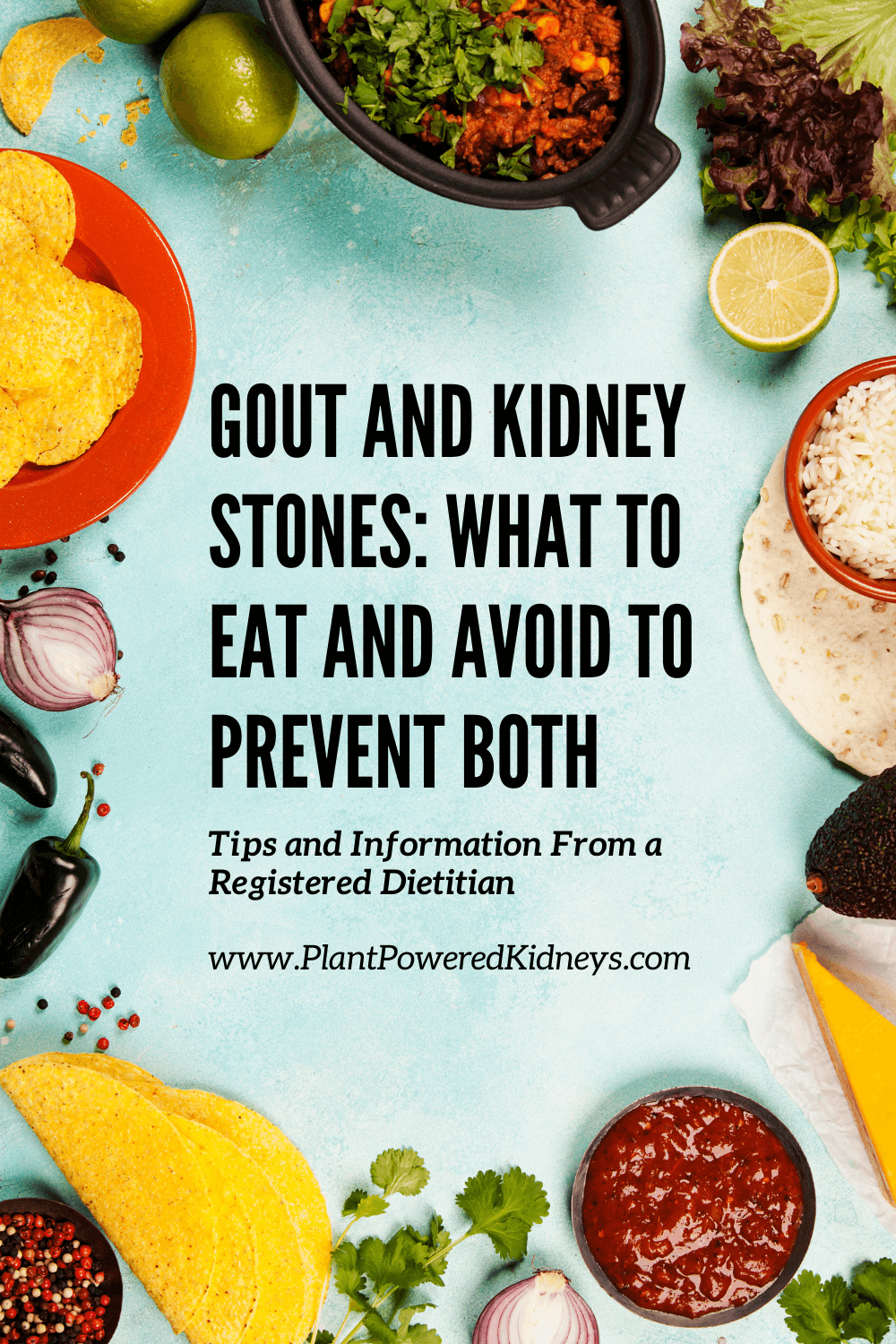
Causes
Gout is caused by a buildup of uric acid.
When a person develops high levels of uric acid in their blood, known as hyperuricemia, the urate crystals can collect and can then stick around the join areas.
High levels of uric acid in the blood is over 7.0 mg/dL in men and 6.0 mg/dL in women.
Hyperuricemia does not always lead to symptoms or a diagnosis of gout.
If high levels of uric acid are noted without symptoms, it may not need to be treated.
Uric acid is produced when the body breaks down purines. The kidneys are generally responsible for eliminating excessive uric acid from the body.
This, however, does not always happen, especially in people with kidney disease.
Who Is At Risk For Gout?
In general, gout is more common in men than women.
Additional risk factors for gout include;
- Obesity
- High blood pressure
- Congestive heart failure
- Insulin resistance or diabetes
- Chronic kidney disease
Those with kidney disease are at a higher risk for gout.
This is because there is a limited ability to remove uric acid from the body.
Other risk factors for developing gout include using certain medications (such as water pills), drinking alcohol, or a diet high in sugar or purines.
We will cover more about the dietary management later in this article.
Gout Symptoms
Gout symptoms include sudden and severe jolts of pain, usually at the joints.
It can make joints feel hot, swollen and tender.
A person experiencing a gout attack may also complain of limited mobility and movement.
How Do I Know If I Have Gout?
Gout can only be diagnosed during a flare.
Your doctor can diagnose with an x-ray and lab tests. They will look for uric acid crystals in the inflamed joint.
Only a doctor can diagnose you with gout.
You can look for a rheumatologist, which is a doctor that specializes in musculoskeletal disease and systemic autoimmune conditions.
Labs to Test for Gout
Some of the lab tests that can be done to check for gout include;
- Synovial fluid analysis
- Uric acid
- Renal function panel
- Basic metabolic panel
- Complete blood count
And as mentioned above, an x-ray or ultrasound of the affected joint can also be used to look for the uric acid crystals.
Medications And Gout
Medications can be a very helpful tool to manage gout. Here are some of the most common medications related to gout.
Allopurinol
One of the most common medications prescribed for gout is allopurinol.
Newer research is now showing that a newer medication, febuxostat (aka Uloric), is showing more promising results in lowering uric acid for those with both gout and kidney disease.
Corticosteroids
Corticosteroids such as prednisone may be prescribed to help with inflammation and pain of gout.
This is also a common medication for certain kidney conditions as well.
Of note are the side effects that can come with corticosteroids, including but not limited to weight gain, increased appetite, and edema.
Another anti-inflammatory drug is colchicine and may be prescribed to help with gout.
It’s important to note that the side effects of this group of medications can include nausea, vomiting, stomach pain, and diarrhea.
NSAIDs
NSAIDs have also been recommended to treat gout. However, NSAIDs can cause kidney disease and are not recommended if there is a family history of kidney disease.
That being said, a study in 2021 found that a group of individuals who had kidney disease was prescribed gout medication without indication the medicine was needed.
Whatever medication you are currently taking, it’s always very important to first discuss any changes with your primary care physician, urologist, or nephrologist.
They will be able to assess your case and determine what medication will be the best for you.
Gout And Chronic Kidney Disease
Kidney disease and gout can be closely intertwined.
A study in 2021 found that those with uncontrolled gout had a significantly increased risk of not only developing kidney disease, but having more advanced kidney disease.
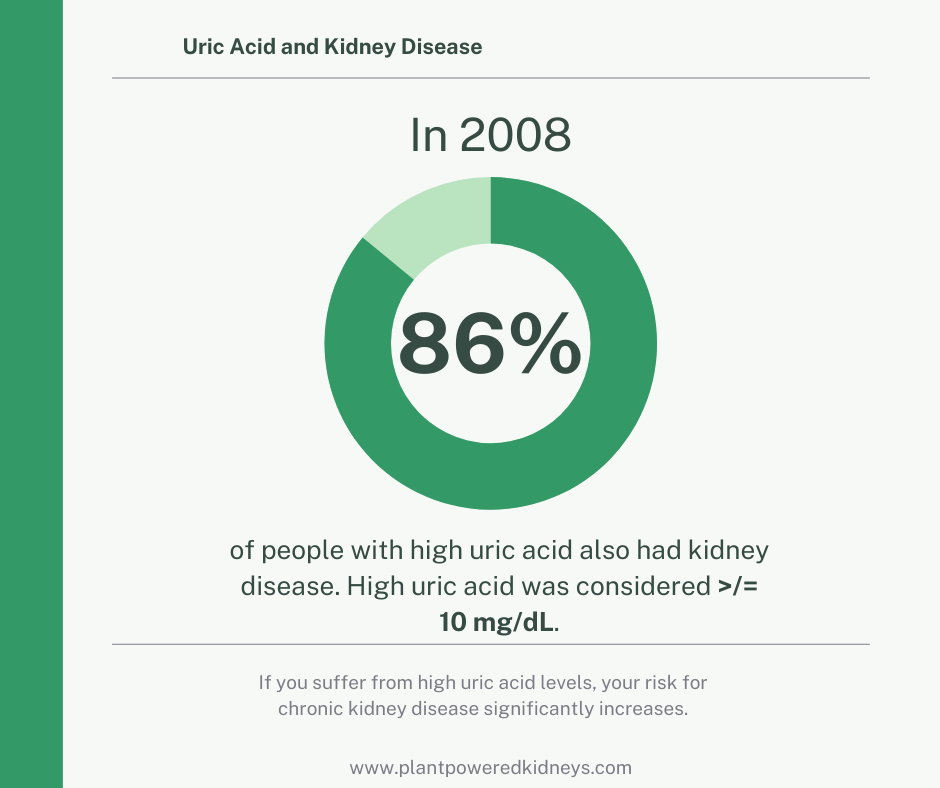
The kidneys are responsible for eliminating more than 70% of the uric acid in the body.
Therefore, if a person has kidney disease it can be important to monitor uric acid levels and make dietary changes to prevent uric acid buildup.
That being said, research has shown that having high levels of uric acid with kidney disease can increase the progression of kidney disease- even without symptoms of gout or kidney stones.
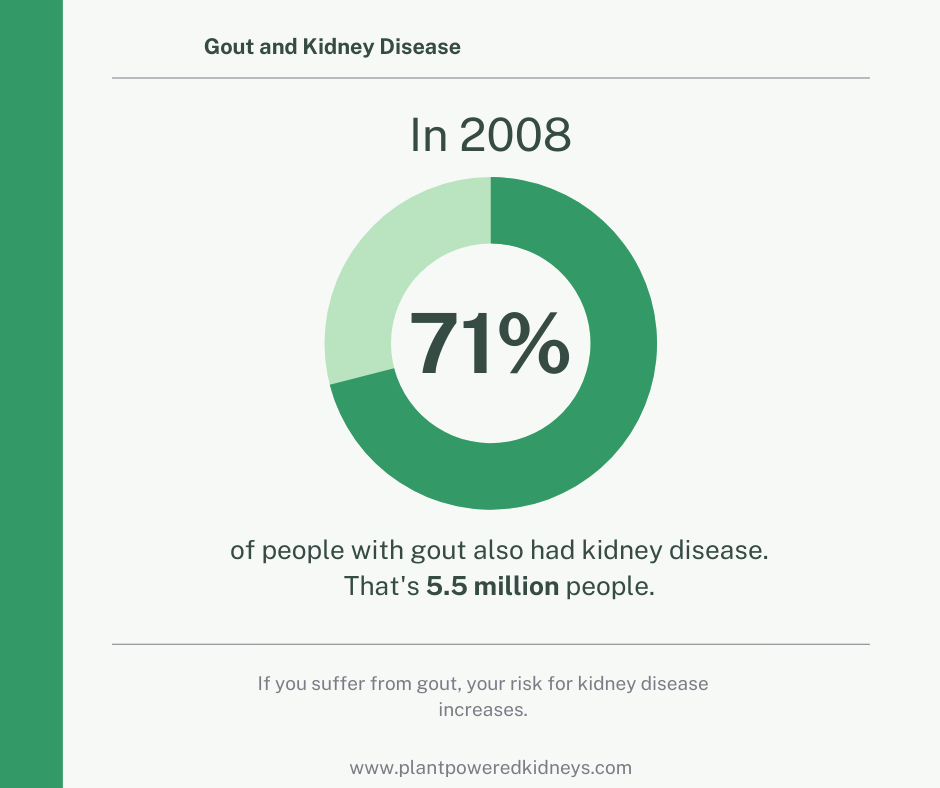
From the National Health and Nutrition Examination Survey in 2008, 71% of people with gout also had kidney disease.
And 86% with severely high uric acid also had kidney disease.
It’s important to be aware of your uric acid level and talk with your doctor about how to best manage it.
Gout and Kidney Stones
Uric acid stones are the second-most commonly formed kidney stones, behind calcium oxalate stones.
As gout is also related to excessive uric acid in the body, the connection between both of these health issues is uric acid.
One study early in 2020 showed 13.9% of participants had kidney stones caused by high uric acid levels.
The ages of the participants in this study were in their 30s up to the 60s.
Another study found that in a group of gout patients, 31% of participants had developed kidney stones.
Of the kidney stone developers, more than half of them had no history of kidney stone formation before their gout diagnosis.
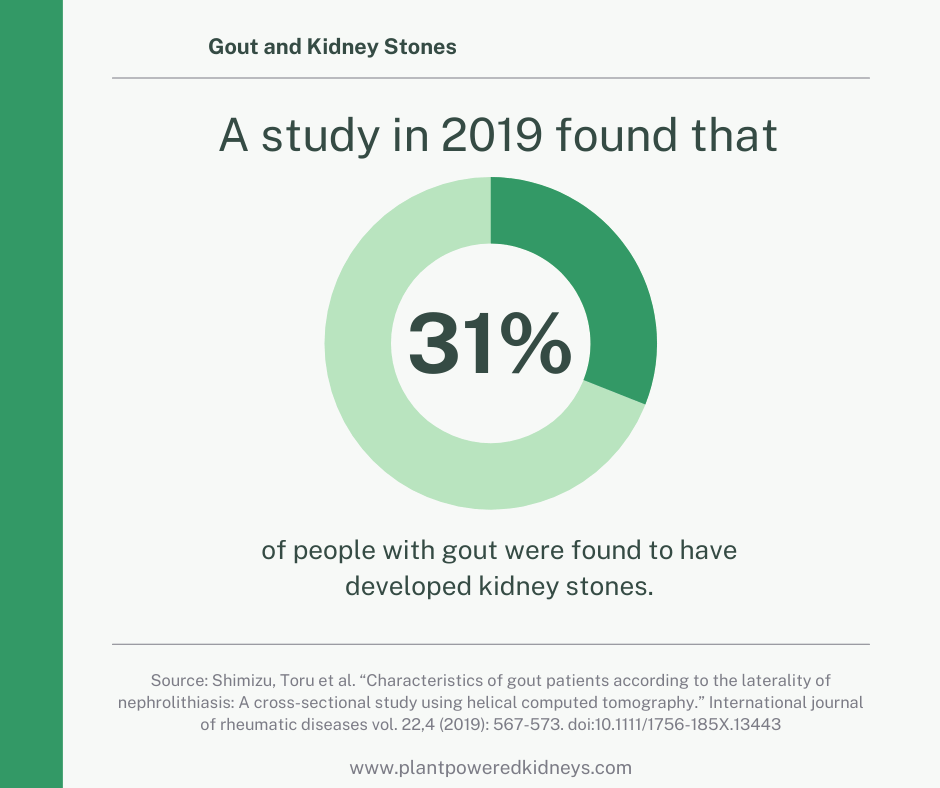
A condition known as uric acid nephrolithiasis is when there is a low urine pH, low urine volume, that lead to uric acid stone formation.
Can You Dissolve Uric Acid Kidney Stones?
Uric acid stones can be dissolved with potassium citrate, a medication prescribed by your urologist.
A urologist is someone who focuses on your urinary tract, including kidney stones. This may be different from a kidney specialist.
If potassium balance is a concern, the doctor may order sodium bicarbonate to help with the urine pH.
Always take prescribed medications as directed by the prescribing physician.
If the stone cannot be dissolved with medication, shock wave lithotripsy or surgical interventions may be needed.
Diet for Both Gout and Kidney Stones
We have covered more about gout, kidney stones, and the connection between the two. Next is what to eat and not eat to prevent gout and kidney stones.
Foods To Limit or Avoid With Gout and Kidney Stones
There are some foods that you will want to avoid if you suffer from both gout and kidney stones.
In limiting or avoiding these foods, you can decrease your risk for gout flares or uric acid stones.
Processed Foods
Processed foods have a higher likelihood of being high in sodium.
A diet high in sodium can cause more gout and uric acid stone attacks.
When possible, read labels to look for low-sodium options in packaged foods.
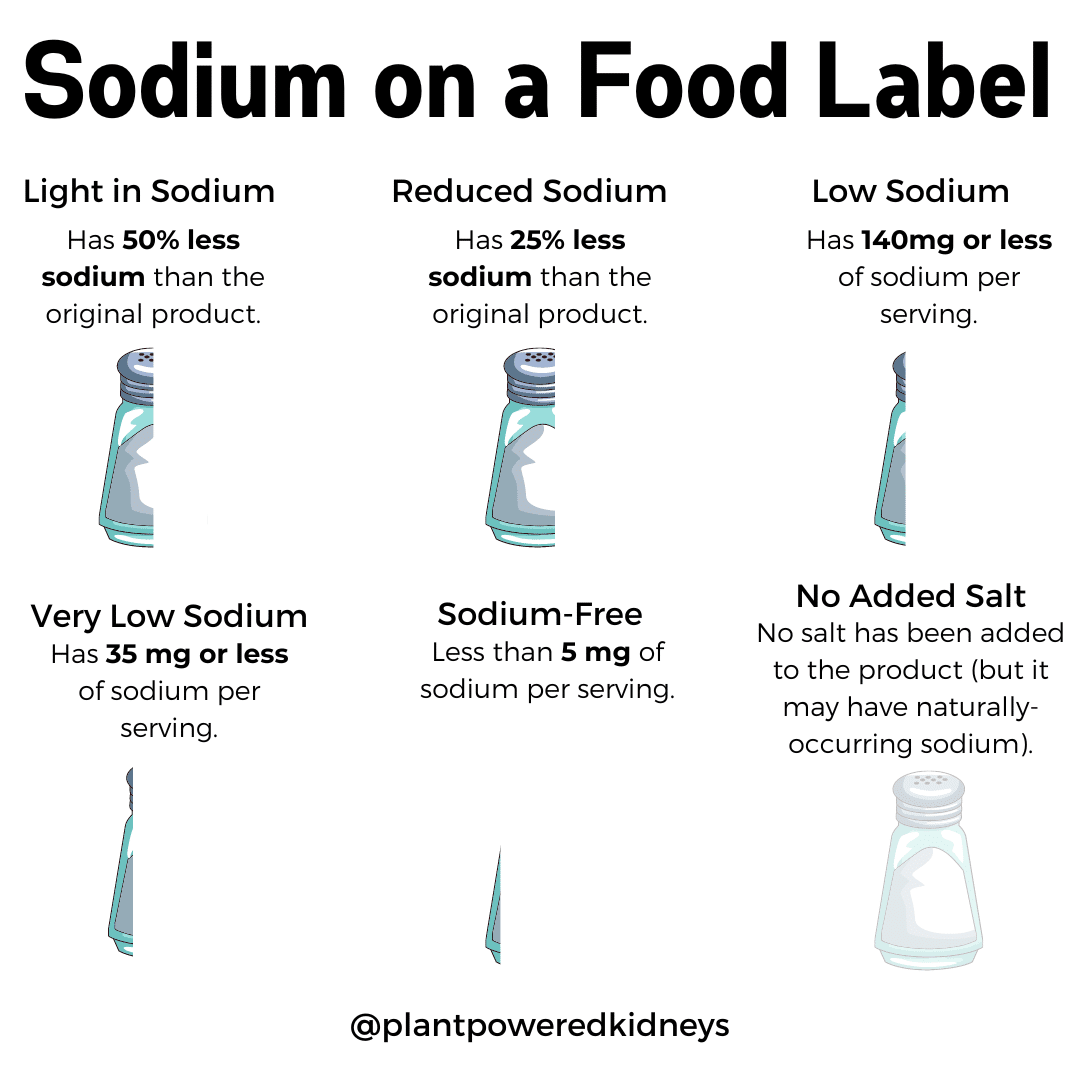
When going out to eat, look for fast food options that are lower in sodium.
Fried Foods
Fried foods have also been associated with a higher risk of high uric acid levels.
By limiting fried and deep-fried foods, you can reduce your risk of high uric acid levels and gout.
Organ Meats
Meats like liver, sweetbreads, and kidney are considered organ meats.
These types of meats are very high in purines. Purines are a natural substance found in foods.
However, purines are the substance that is what can cause gout attacks.
Because of this, avoiding these foods can be very helpful in preventing both gout and uric acid stones.
Animal Meat
Beyond just organ meats, animal meats like beef, lamb, and pork can also contribute to uric acid levels and the risk of kidney stones.
High-protein diets increase the risk for high uric acid levels.
Regarding kidney stones, a high protein diet can reduce the levels of citrate in the urine.
Citrate helps prevent kidney stones from forming.
Animal meats may also need to be limited if you have kidney disease. Many need to follow a low protein diet.
Some Seafood
Seafood can contain high amounts of purines.
Examples of high purine seafood include:
- Tuna
- Sardines
- Shellfish
- Anchovies
Eating too much of these can increase uric acid levels.
That being said, including a small amount of fish rich in omega-3s has been associated with fewer gout flares.
Alcohol
Drinking too much alcohol can increase uric acid levels.
While alcohol is thought to be helpful with urinating as a diuretic, alcohol has been shown to increase uric acid levels, uric acid stones, and gout.
Wine has more recently been in question as to whether or not it can increase the risk of gout.
Added Sugars
Sugary foods like cereals, doughnuts, candies, chocolates, and sodas – while delicious and fun treats – can be very high in added sugar.
Excess sugar has been linked to an increased risk of gout.
Kidney stones are also found to be more common in diets high in sugar and sweeteners, especially sugary beverages and fructose.
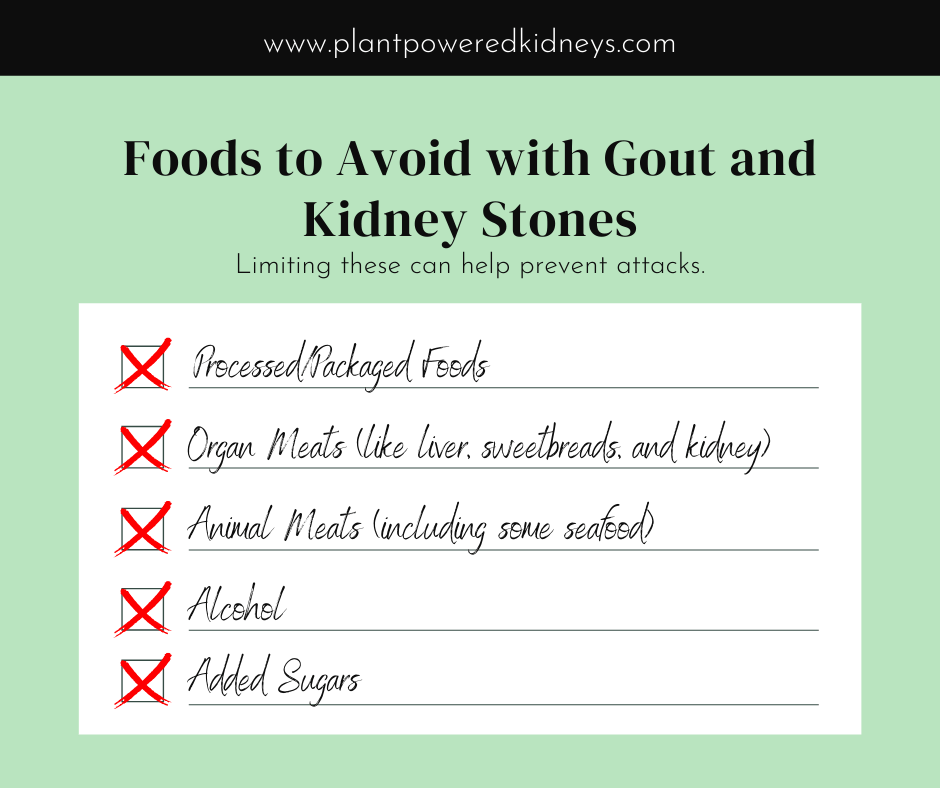
Foods To Include for both Gout and Kidney Stones
While the thought of eating with both gout and kidney stones sounds overwhelming, there are plenty of foods you can enjoy while still avoiding both.
Fruits
Evidence has shown that cherries (any type) can help in reducing gout attacks.
Even though fruit is a source of fructose, they are not shown to be a factor in a high-fructose diet.
A diet rich in fruits and vegetables has been associated with lower uric acid levels.
Additionally, fruits and vegetables are also a great part of a low PRAL diet for kidney disease.
There are also plenty of low potassium fruits that can be included for a low potassium diet.
Vegetables
Getting enough vegetables is important for both gout and kidney stone prevention.
They provide many nutrients that help the body.
While there are some high-purine vegetables, like asparagus and spinach, research shows moderate consumption of these doesn’t increase the risk of gout attacks.
Certain high-oxalate vegetables such as spinach, beets, potatoes, and okra may need to be limited or avoided if oxalate levels are high.
However, oxalate stones are different than uric acid kidney stones.
Whole Grains
Whole grains are a part of the DASH Diet. A long-term study found that people following the DASH diet had a lower risk of high uric acid levels and gout.
Even whole grains that have purines have great benefits to help lower the risk of heart disease, stroke, and diabetes!
Heart-Healthy Fats
Heart-healthy fats, also part of the DASH diet, can be included in a diet that avoids gout, kidney stones, and even kidney disease.
A study looking at omega-3 polyunsaturated fats and gout found that diets that included these healthy fats had a lower risk of gout.
Interestingly, the omega-3 supplements alone did not have the same results.
Avocado oil, olive oil, flaxseed/flaxseed oil, chia seeds, hemp seeds are all examples of heart-healthy fats.
Nuts and Nut Butters
Another healthy fat source! Peanuts have specifically been found to be in a diet that produced lower urate levels.
Certain nuts like almonds may need to be limited for calcium oxalate stones. However, uric acid stones and gout-related diet recommendations do not need an oxalate restriction.
Dairy
Dairy has seen to have a protective factor in preventing gout attacks.
And while calcium is an important part of preventing calcium oxalate stones, it is not associated with an increased risk of uric acid stones.
The best dairy options to include are low-fat dairy products like milk, yogurt, and some cheeses.
Of note is that dairy is higher in phosphorus, so it will also be important to read labels to avoid any phosphate additives.
Lean Meats
Lean meats such as chicken and some fish may be suitable for a diet to prevent both gout and uric acid kidney stones.
However, as mentioned above, portion size is the most important factor when including something like this in your diet.
Too much protein can cause gout or kidney stones.
Keep animal protein choices to about 4 to 6 ounces daily or per your dietitian’s guidelines.
Learn more about a low protein diet for kidney disease here.
Coffee
In moderation, coffee is shown to lower the risk of gout. There is not enough evidence to prove coffee to lower any risk of high uric acid levels though.
Remember, you can have coffee with kidney disease.
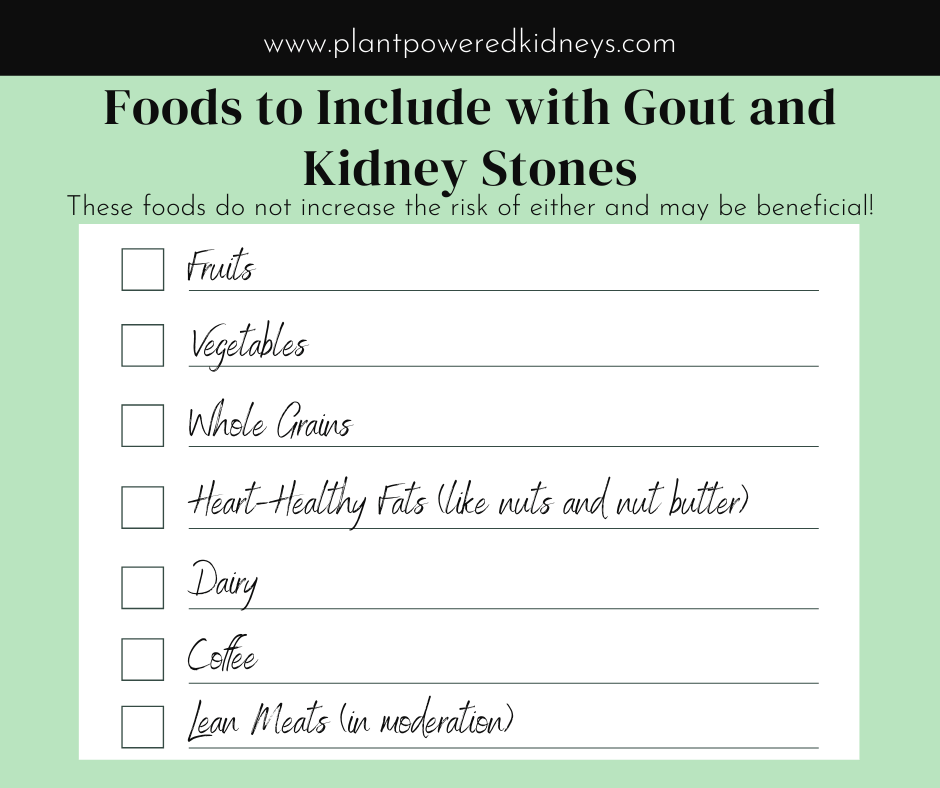
Water & Hydration
Drinking enough water is crucial to preventing both high uric acid and kidney stones.
Recommendations can start at 8 or more cups per day.
As mentioned above, not all beverages are treated equally with hydration. Water should be the main fluid you drink.
Coffee can be included in small amounts and seen as beneficial.
Milk will count as a good fluid as well, as dairy is preventative for kidney stones and high uric acid.
Be sure to check with your dietitian or doctor about how much water you should be drinking.
If you are on a fluid restriction, drinking above your personal limit will not help and could actually cause more problems.
Supplements
There is limited research on supplements that prevent gout and kidney stones.
In fact, most supplements that people think of as helping can actually cause more risk.
Vitamin C
Vitamin C has been shown to be helpful with preventing gout flares.
However, a review found that taking higher doses of vitamin C did not directly correlate with preventing or treating gout.
Vitamin C supplements are something to be careful with if you have kidney disease. This is because the kidneys are responsible for getting rid of any excess vitamin C.
An increased risk of kidney stones has been seen in men with vitamin C supplements.
Vitamin C can be converted into oxalate in our body. Because of this, those with calcium oxalate kidney stones could then risk more kidney stones.
We can get plenty of vitamin C in our diet with fruits and vegetables. If you’d like to add some more in an easy way, try squeezing some lemon juice into your water.
A benefit of this method is that the lemon also adds citrate to your water, which also helps prevent kidney stones.
Potassium Citrate
Potassium citrate is a common medication/supplement prescription used to prevent both gout and kidney stones.
It helps reduce the amount of acid in the body.
Some benefits have been observed. However, many kidney patients may be required to limit potassium in their diet.
This can mean something like potassium citrate may cause harm to someone with kidney disease.
Summary
While gout and kidney stones can both be painful diagnoses and situations. Many of the factors involved in how often they happen can be modified through changes in the diet.
Focus on a diet rich in fruits and vegetables, whole grains, dairy, and lean meats. These food groups have been associated with fewer gout and kidney stone attacks.
It’s also important to stay well hydrated by drinking plenty of water. Coffee, tea, and milk can also be fluids that can be included and not increase risk of gout or uric acid kidney stones.
Stick to a diet low in sodium, animal meats, added sugars, and alcohol to help prevent gout flares and uric acid kidney stones.
Supplementing with vitamin C is not proven to be effective in preventing either gout nor uric acid kidney stones. However, getting adequate vitamin C from foods in the diet may help reduce the risk of gout attacks.
Potassium citrate may be prescribed to help both gout and kidney stones. However, it’s important that it comes from your physician as it can impact potassium balance with kidney patients.
Doing these things can not only help prevent gout flares but also protect against uric acid stones.
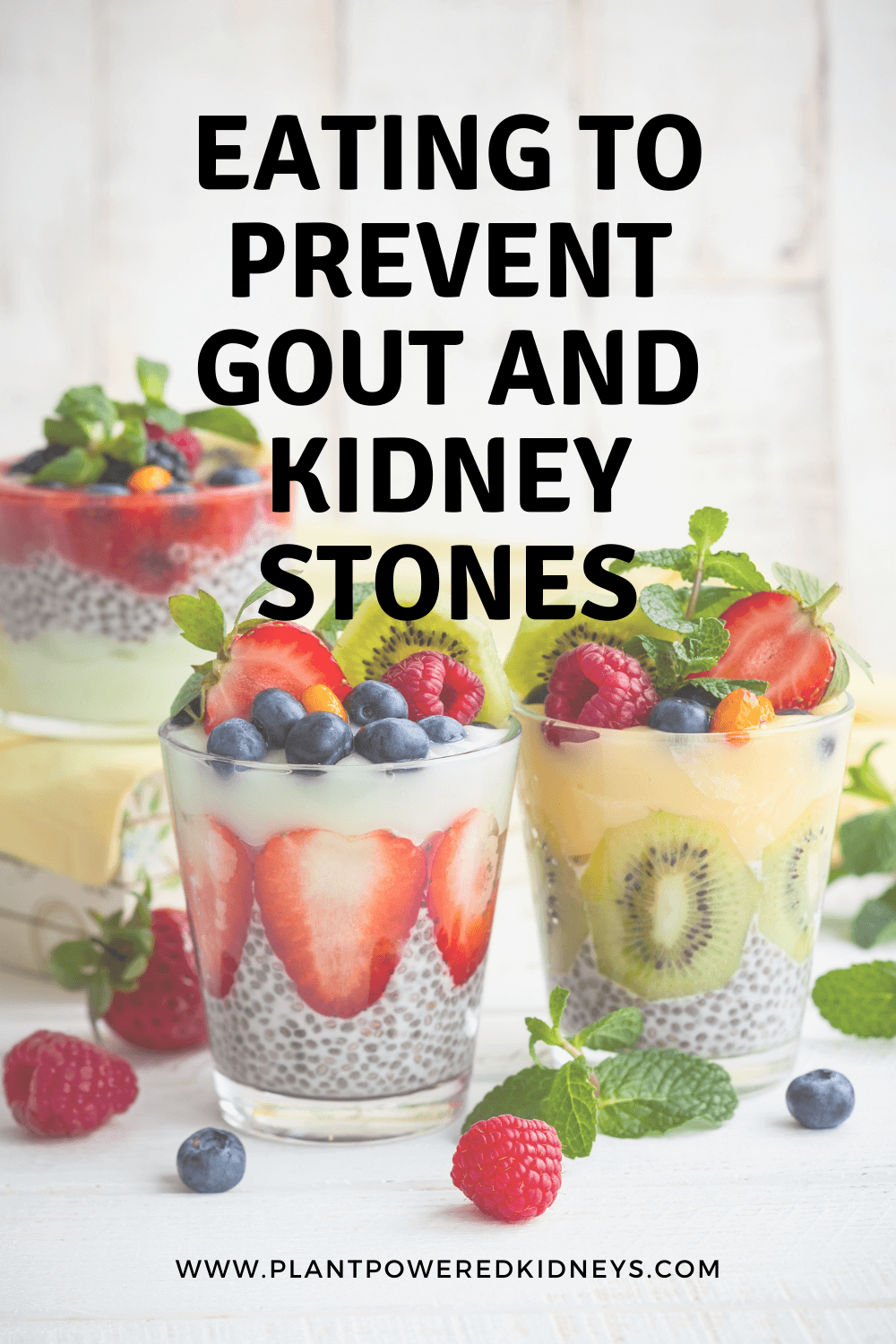



One of the side effects of allopurinol is kidney damage. Have you seen any decline in kidney functions on your patients who have been taking this gout medication for a long time?
Thank you.
The connection with allopurinol and kidney function is more that the medication can accumulate in the body with kidney damage, not that the medication itself causes a decline in kidney function (reference). As a dietitian, I advise my clients to always discuss prescribed medications with their prescribing physician to understand what the plan, goals, and expectations are with the medications. But to answer your question, no, I have not seen clients have a drop in kidney function related to allopurinol. I have seen it related to high uric acid levels.
Allopurinol (synthesis) was not tolerated by my liver, so I switched to Probenecid (excretion), which effectively mitigated gout but promoted kidney stones (most likely due to insufficient hydration). Thank you for the helpful information presented on this page and in the video!
Great point to share- everyone has different experiences and what may work for one may not work for another. So happy to hear you’ve found this information helpful, Jim. Thank you!
Yes, my husband has high uric acid and his in allopurinol before right after knowing that he a cdk 4 his doctor changed his allopurinol to febuxostat and I have no idea if it will make his cdk progress, pls help me his uric acid is normal now I don’t know if it’s ok to stop febuxostat already
We can’t advise anything regarding the medication, unfortunately. It’s important to speak with the prescribing doctor about any concerns you or your husband may have with it. Best of luck to you, Marcelina!
Can you tell me if Thalium isotopes used for a nuclear heart test will cause any harm? They told me the isotopes will be gone in a couple of days. Stage 3.. Thank you so much!!
Hi Linda,
That’s a bit out of my wheelhouse, unfortunately. This sounds like a great question for the cardiologist or primary doctor!
Good luck!
Jen
My husband has gout and has acute kidney failure. He has been on dialysis for about a month. They are telling him to eat more protein. What protein is ok for him to have since he has gout? We have also started the low sodium diet. I’m hoping this will help with both problems. Just confused how to help the gout.
Wow, sounds tricky for sure! His dietitian should have some recommendations that would best suit him. I also just published a new article today about protein supplements for dialysis patients that may be helpful. In general, make sure the proteins are low in sodium – salt does a lot with gout flares.
I have a question about the nurse and nut butters that are good to eat. Some list I have read say no nuts or only an ounce or so. I love pecans, walnuts and peanuts and peanut butter. I would like specific amounts even when limited if possible.
Julie, you’re going to love the article that comes out tomorrow!
Hi Jen! Fellow RD that came looking to you for help educating my mom on what to avoid eating since she’s has gout now twice in very close succession. I hit on the major foods, but she was given a handout at her doctor that had pancakes, french toast and muffins on it as foods to avoid. No specifics as to if they would be from a box versus home made. I can’t quite figure out why they made the list. Any thoughts?!
Hi Kim! It may be that those types of foods include baking powder as a leavening product, which is phosphorus. But honestly, this sounds like a very outdated handout. Any time that a blanket statement of avoiding an entire food – rather than discussing label reading and what to look for- is a 🚩 red flag to me!
Excess uric acid is normally caused by high purine foods such as red meat, shellfish and beer. You can take allopurinol medication. But there are only a few natural remedies that have been proven to reduce uric acid in human clinical trials; tart cherry, curcumin and lemon juice. http://beatgout.org/purine-gout-dietary
Allopurinol (synthesis) was not tolerated by my liver, so I switched to Probenecid (excretion), which effectively mitigated gout but promoted kidney stones (most likely due to insufficient hydration). Thank you for the helpful information presented on this page and in the video!
We’re happy to hear you have a plan and are being active in your care. Thanks for the support! 💚
Hi. I happen to have hemochromatosis along with gout. I have been reading that phlebotomies may not only help ferritin levels but also uremic acid levels. Can you please comment on that ?
This would be more on the medical side of things, so something to speak with your physician about. 😊